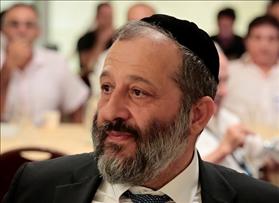Haredi politicians argue for religious freedom only when it benefits them
Does Shas leader Aryeh Deri promote religious freedom?
This week Shas leader and Interior Minister Rabbi Aryeh Deri turned to Israel's Attorney General, demanding that the mandatory guidelines regarding the exclusion of women in the public sphere be suspended and reconsidered.
Uri Regev 27/07/2017 00:12
Tags: Aryeh Deri · Agudath Israel · hypocrisy · religious freedom

Interior Minister Aryeh Deri, Shas Party leader
The State of Israel's official guidelines were developed after lengthy consideration in the Attorney General's Office and adopted by the previous government. They are intended to counter the growing religious extremism in the ultra-Orthodox sector, which expresses itself, in part, by greater pressures to exclude or strictly separate women from men in public venues.
One can easily understand, albeit object to, Deri's attempts at turning the clock back, as he and his colleagues successfully did in all other matters in which the previous government made progress in the arena of religious freedom and equality. However, what deserves special attention and repudiation is Deri's cynical use of "religious freedom" claims:
"Religious freedom, which is a constitutional principle, beyond dispute in our country, enables every citizen to choose his religion, believe in it, practice all that his faith requires, avoid all that his faith forbids... all with the intention of implementing [the tenets of] his faith in theory and in practice. The rights of the minority to observe their faith and religion in a way that enables them to realize their rights as equal citizens in the State of Israel... are an integral and essential part of their religious faith."
Anyone who has followed Deri's political path and that of his ultra-Orthodox political colleagues knows that the last thing Deri truly believes in, let alone promotes and defends, is religious freedom for all. He invokes religious freedom, as do his colleagues, only when it is aimed at safeguarding the rights of his voters and fellow fundamentalist co-religionists. But when it comes to religious freedom and the protection of religious choices of all citizens, not only one would not find Deri among the Crusaders, but rather he would be at the forefront of those suppressing other's religious freedoms. This was most recently evidenced in his leading role in undermining the Western Wall compromise and preventing both the egalitarian worship of non-Orthodox Jews at the Kotel, as well as women's prayer groups.
Ultra-Orthodox leadership invokes noble principles in order to safeguard THEIR religious liberties, but they don't blink eyelash when trampling upon the religious freedoms or civil liberties of others.
This isn't a new phenomenon, nor is it a one time act of hypocrisy - it is, rather, a consistent form of behavior. Both in Israel and overseas, ultra-Orthodox leadership invokes noble principles in order to safeguard THEIR religious liberties, but they don't blink eyelash when trampling upon the religious freedoms or civil liberties of others. One classic example that comes to mind is the 1993 Religious Freedom Restoration act. When President Clinton signed it into law, Agudath Israel of America publicly proclaimed:
“This is a proud and auspicious day for freedom of religion and freedom of conscience in this country... Congress and the president have now... declared with resounding affirmation: religious liberty is a fundamental freedom of the highest order.”
Even more recently, when a number of European states initiated restrictions on, or even banned kosher slaughter and infant circumcision, both local and international ultra-Orthodox leadership, along with Israeli political allies, stepped in against these initiatives invoking this important principles of religious freedom.
It's high time that our community opens up its eyes to this travesty and hypocrisy; and challenges publicly the ultra-Orthodox organizational and political leadership that sees no moral or principle disparity, arguing for religious freedom when it benefits them, and denying this very right to others with whom they theologically disagree.